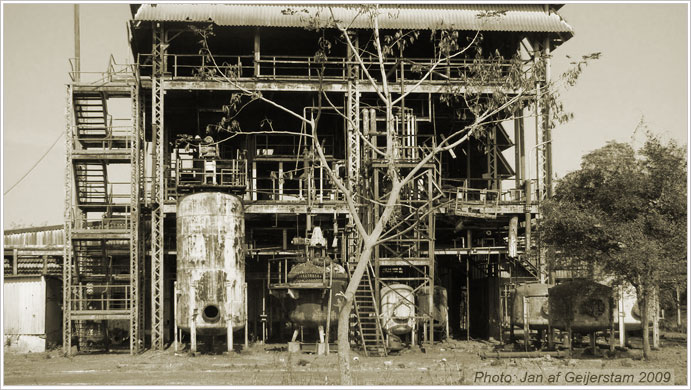 |
|
||||||||||||||||
When : 23 January to 4th February 2011
Over the course of two weeks in December 2010 students and experts from multiple disciplines and backgrounds will converge in Bhopal and work together with local participants in an attempt to understand the tragedy and its site in its conflicting interpretations. In exploring key issues linked to the emergence of the Bhopal Gas Tragedy Site as a cultural heritage site, Bhopal2011 sets the ground for a collaborative effort around the Bhopal Gas where disciplines of cultural heritage, architecture, urban design and applied arts form alliances with diverse disciplines of culture sociology, global studies, culture geography and development studies.
Where: Bhopal, India Through exploring the possible transformation of the site into a place of remembrance and a resource for empowering the local community the participants will also address the broader issue of how heritage sites with a troubled and troubling legacy can contribute to a better understanding of our times. Within a collaborative framework the conference and the workshop will explore three main themes. THEME1 Challenges in recognizing contemporary sites with a conflicting past as heritage Sites with conflicts and painful associations contain memories of traumas that societies and humans tend to forget or suppress. Thus they find resistance in getting acknowledged as heritage. In the construct of the Bhopal tragedy and its perceptions in society questions concerning ethics, socio-politics, neo-colonialism and gender are put to the fore. Can Bhopal find a place in our common understanding of 'heritage'? The answer will be critical in giving us a tool and precedent for identifying and appropriating sites of contemporary and conflicting heritage. THEME 2 Challenges in interpreting and rehabilitating sites with conflicting narratives The process of interpretation encompasses of multiple narratives that claim owner-ship of heritage sites. The legacy of Bhopal is a battleground for various conflicting perspectives. It is a challenge for those entrusted with interpreting such sites to give visual and spatial form and content to complex narratives. There is also a need to address the conflicts that arise between universalistic interpretation of heritage and its local understanding. The symposium and workshop will focus on differences and alternative interpretations and the role of cultural heritage as a democratic force in the local society. THEME 3 Challenges in developing heritages sites for society building Bhopal's tragedy and the structures of the plant could be of enormous significance to the global discourse on balancing development with equity and ecology. The site could be of tremendous educative value for future generations. But how can this be made manifest? Bhopal2011 will also look at the possible protection, decon-tamination and rehabilitation of Union Carbide factory as a potential to revitalize the community around the tragedy site. |
||||||||||||||||
 |
||||||||||||||||
|
There are three main parts to the event: the workshop, the symposium and the exhibition/ heritage tours. While the three parts together are structured as a continuous narrative that captures 'looking back', 'looking at' and 'looking beyond', it is flexible enough to allow participation in one of the three capsules and still take back the essence of the debate.
The Workshop will be spread over ten days and is structured along the lines of past workshops by mAAN, in Shanghai 2004 and in Padang, Indonesia 2009 (www.m-aan.org). The workshop explores methods that can be used to meet the practical and theoretical challenges of the rehabilitation of the Bhopal Tragedy Site. Experts and students in related disciplines as well as stakeholders involved with the Tragedy will engage in dialogue to produce schematic proposals addressing the overall site or key concerns related to the site. The workshop output will provide the orientation and stimulus for debate and dialogue for the following Symposium. The Symposium shall take place over three days looking at the Bhopal Gas Tragedy and its impact from multidisciplinary perspectives. Students will present their work from the workshop to a panel of jurists. The workshop results will be discussed in the light of issues related to the social, urban and ecological consequences of the Tragedy and the nature of its legacy. Representatives of the community hit by the tragedy, social workers, policy analysts, heritage experts, environmentalists and bureaucrats will present a critique of Bhopal after 25 years of the disaster. The Exhibition and the Post Conference Tours will form the last leg of the event focused on public dissemination of the Bhopal 2011 outcomes. The exhibition opening will be a one day public event at Bharat Bhavan, one of Bhopal´s prime Modern architecture landmarks. While showcasing the work done through the course of the workshop, the opening will provide an occasion to outline future initiatives and collaborations based on Bhopal. Following the opening of the exhibition heritage tours will proceed to sites of industrial, modern and politically conflicted sites along with the highlights of the more traditional tourist itinerary to Mumbai or the "Golden triangle" cities of Agra-Jaipur-Delhi. |
| Copyright 2010 © Bhopal 2011. All rights reserved | For Feedback or comments: contact Webmaster |
|



